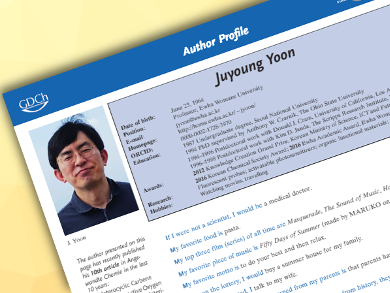In 2009, Angewandte Chemie launched its Author Profiles section, where authors who had published their 10th, 25th, or 50th paper are highlighted in a one- or two-page feature. Juyoung Yoon’s Author Profile is the 500th of this popular series to be printed. Among other details, Yoon tells us what his favorite food is, and what he would be if he weren’t a chemist. Yoon, from Ewha Womans University, Seoul, South Korea, also tells us what he would do if he won the lottery and why he chose chemistry as a career.
The first Author Profile was of Roland A. Fischer, then at the Ruhr-Universität Bochum, Germany, and now at the Technische Universität München, Germany, who was on the Editorial Board of Angewandte Chemie from 2009–2016. Since then, the top five countries of profiled authors are Germany, USA, Japan, China, and the UK.

In order to present a more accurate cross-section of the community, the criteria for Author Profiles have recently been expanded: authors need to have published ten papers in the last ten years (with the majority as corresponding author) or to have received an award or other honor, with the option of special extended Author Profiles for milestones such as 25 or 50 papers.
The eldest authors who have been featured are Jean’ne M. Shreeve, University of Idaho, USA, whose motto is “full speed ahead”, and John B. Goodenough, University of Texas at Austin, USA, who credits fortunate choices as being the secret of such a long and successful career.
Some questions bring a range of answers: if scientists could be described as animals, they would be an eagle (Xingang Zhang, Shanghai Institute of Organic Chemistry, China, and Qichun Zhang, Nanyang Technological University, Singapore), a sloth (Carlo Unverzagt, University of Bayreuth, Germany), a tortoise (John B. Goodenough), a cow (Wenping Hu, Tianjin University, China), or a velociraptor (Rik R. Tykwinski, University of Alberta, Canada). Some answers haven’t changed since 2009—the most popular way to deal with frustration is to go for a run or bicycle ride, and the biggest problems that scientists face are the public perception of science, restricted funding, and too many administrative duties.

Also of Interest
- Clever Picture: Do You Fit the Angewandte Mold?,
Jonas Mattheier,
ChemViews Mag. 2017.
https://doi.org/10.1002/chemv.201700066
What makes a successful author of Angewandte Chemie?




